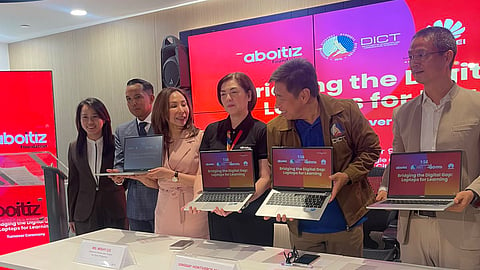
- NEWS
- the EDIT
- COMMENTARY
- BUSINESS
- LIFE
- SHOW
- ACTION
- GLOBAL GOALS
- SNAPS
- DYARYO TIRADA
- MORE

A turnover ceremony was held today at Ayala Triangle Gardens, marking the official handover of 100 laptops to support digital education in underserved communities across the Philippines.
The event, titled "Laptops for Learning," was led by major players in both government and private sectors. In attendance were Mishy Co, Executive Director and Trustee of Go Digital PH; Ginggay Hontiveros Malvar, President of Aboitiz Foundation Inc.; Henry Rhoel Aguda, Secretary of the Department of Information and Communications Technology (DICT); and William Hu, Vice President of Huawei Philippines.
The turnover forms part of the Aboitiz Foundation’s flagship program, Aurora PH, which aims to uplift the quality of education through modern technology and training. The program also includes awareness campaigns and skill-building efforts to ensure digital literacy within communities, especially those that are geographically isolated and economically disadvantaged.
In her opening remarks, Hontiveros-Malvar stressed the need for inclusive technology access in the Philippines. She explained how education in the digital age must go hand in hand with proper resources, especially in public schools and remote areas.
Malvar discussed how access to technology is no longer a privilege; it’s a right, that these laptops are not just tools, they are "stepping stones toward equal opportunity."
The laptops will be donated through a collaborative effort between Huawei Philippines and Go Digital. Putting emphasis on the company’s commitment to supporting digital transformation initiatives in the Philippines, particularly in the field of education.
DICT Secretary Henry Rhoel Aguda also addressed the crowd, highlighting the broader implications of the initiative beyond education. He said that projects like this align with the national government’s digital transformation goals, which include making technology more affordable, accessible, and secure for all Filipinos.
Aguda stated that digitalization must be inclusive, and today’s turnover supports not just education but also economic resilience, communication, and access to government services.
He also pointed out the pricing gap in tech products across the country, noting that devices can be 20 to 30 percent more expensive in regions outside Metro Manila. Addressing this disparity, he said, is essential to ensuring no one is left behind.
In addition, Aguda mentioned ongoing government efforts to improve the country’s telecom infrastructure. Plans are underway to phase out 2G phones and replace them with more affordable, signal-boosting devices to strengthen connectivity in rural areas — especially during times of natural disasters.
Closing the event, Ms. Mishy Co of Go Digital PH expressed her gratitude to the donors and government partners, underscoring the long-term vision of the initiative.
“Our goal is simple — to make life easier and more hopeful for every Filipino. Technology can and should be a great equalizer,” Co said.
She also emphasized the importance of sustainability and accountability in such programs to ensure they make lasting impacts on beneficiaries.
As digital tools become increasingly vital to education, employment, and civic engagement, efforts like the “Laptops for Learning” turnover show that meaningful progress is possible when public and private sectors work together.
